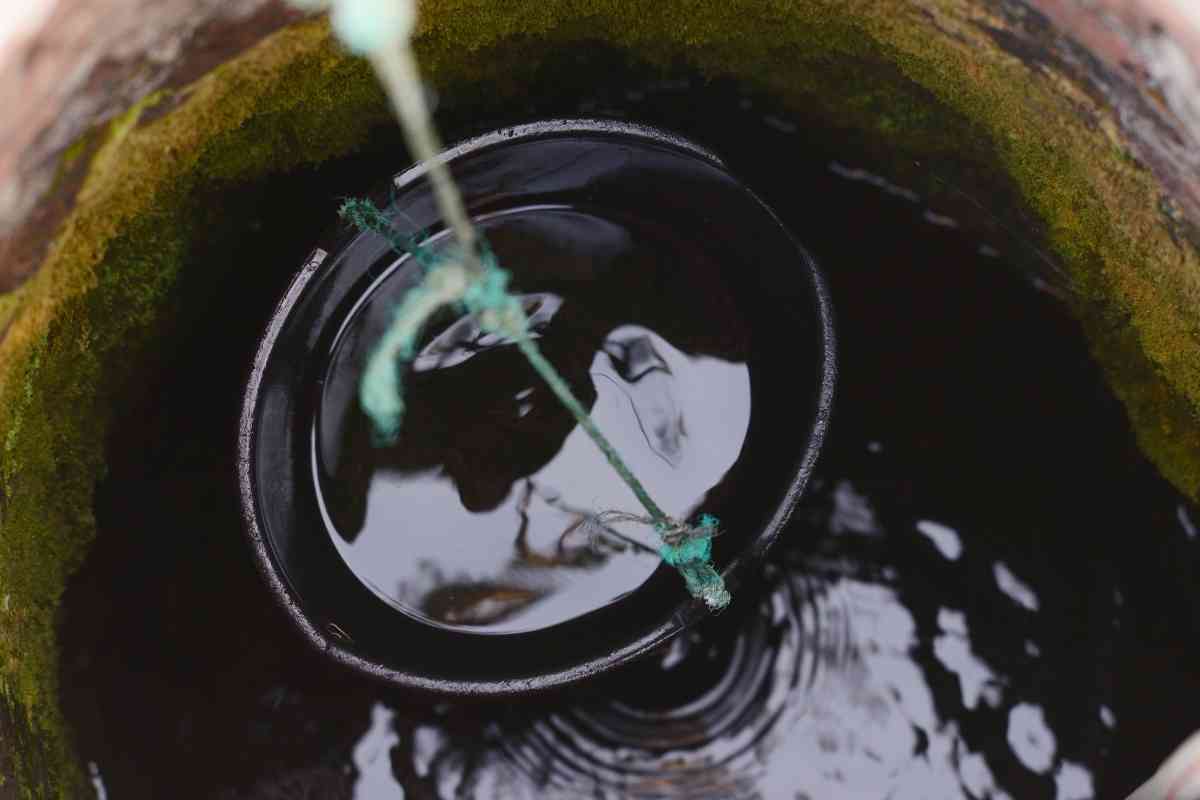The Truth About Well Water That Smells Like Metal
When water smells like metal, it is easy to feel concerned about the safety and potential health risks of continuing to use your well. It is important to understand the contents of your well water – especially when it is your primary drinking source. However, there are a number of different factors from bacteria to chlorine, metals to pollutants, that need to be considered when assessing why your well water smells like metal.

Why does my well water smell like metal?
The truth about well water that smells like metal is that it is most likely due to an increase in iron, copper, or zin content. Usually, the smell is caused by dated residential infrastructure such as corroded pipes, fitting, and tanks in your plumbing.
Despite what many people think, having traces of certain metals inside of your well water can actually be good, as they provide significant health benefits.
With that being said, too much of anything isn’t good and if your well water has enough metal content inside of it to give off an odor, you should figure out exactly why it’s happening so that you can identify the source and resolve it. It is particularly important to take action on this matter given that you do not know the actual cause of the smell.
Multiple different sources could be contributing to this issue – with some being considerably more harmful than others. To help you understand this further, we are going to take a closer look at the truth behind well water that smells like metal.
After extensively researching well water contaminations, I have been able to gather enough information to determine why your well water can smell like metal. My research has indicated that although most metallic smells from well water are not a sign of a life-threatening hazard, the source of the contamination should always be investigated.
| Related Article! |
| Why Does My Well Water Smell Like Sewage? |
Why Does My Well Water Smell Like Metal?
You will find that virtually every well will have some traces of metal. This is typically described as soft or hard water – with soft having less metal and mineral content and hard containing more.
Water softness and hardness are generally not indicators of poor quality water, but if it starts to give off a smell, there is likely an imbalanced concentration of metal flowing in your system.
The most common metals that cause this are iron, manganese, and zinc. The good news is that these metals are non-toxic, so there should not be any immediate threat to your health.
However, if there is an imbalance of these metals in your well water system, then there are potential risks involved if you continue to drink it – especially over a prolonged period of time.
Factors that Cause Well Water to Smell Like Metal
If you want to identify the source of the metal smell of your well water, you need to consider that there is more than one thing that could be causing this to occur. Metals are abundant in our environment and can often naturally make their way into our wells.
However, the increased metal content of your well water can also be unnatural and it could potentially be caused by human activity. Understanding each possible source for the increased metal content in your well water is going to be crucial for getting rid of it.
Residential Infrastructure
One of the most common reasons for well water smelling like metal is the residential infrastructure of your home or urban area. If the metallic smell is coming from the well itself, then it could be due to poor or outdated materials and design.
You may have a metal material lining your well or tank which has corroded over the years and is now creating an influx of trace metals in the entire water source.
This is not an easy fix and may require the reconstruction of the well entirely. However, this is rarely a cause for well water smelling metal these days.
More often than not, the metallic smell of your water is due to your home’s pipes. After decades of use, a lot of pipes will start to corrode and become rusted. This will cause your residential water to start to smell like metal. If the pipes are very corroded, you will not only be able to smell the metal in the water but even taste and see it in some cases.
Depending on the pipes that you have in your home, they could be made out of several different types of metals – with iron and copper both being quite common.
However, you can pinpoint whether the corrosion is connected to all of your pipes or just a portion by checking if the smell is coming from each access point. Turn on each sink, shower, and hose in your home to see if the metal smell is present everywhere or if it is isolated.
Check your appliances for leaks too. A faulty water heater, water softener, rusty water faucet, or another issue with your water distribution system could cause iron and other metals to leak into your pipes.
Agricultural Pollution
If you live in a region that has a lot of farming and agriculture, this can affect the quality of your water. Agriculture has been known the be quite destructive to local environments and it causes a considerable amount of pollution – including adding metal to water sources.
The agricultural industry is linked to many environmental issues that have affected human health. Large amounts of dangerous trace metals have been found in water sources due to inorganic farming practices.
Harmful fertilizers can contain toxic metals such as lead, arsenic, and cadmium, which are all very dangerous to human health.
Overwatering and rainfall without the implementation of pollution prevention measures such as buffer strips can easily result in these metals flowing into water systems – including wells. Metallic smells in well water caused by agricultural pollution can be a very serious issue that can result in human health complications.
Industrial Pollution
Industrial pollution is particularly destructive and if you live in any area where industries are present, it could be what is causing your well water to smell like metal. Industries often work with various types of metals either for extraction or processing and poor waste management results in water and soil pollution that could easily spill into your well.
This is particularly common with mines but this is an issue in various industries around the world. It can be tricky to pinpoint exactly which metal is flowing into your well from an industrial operation given the fact that there are so many different kinds extracted and processed.

Common Trace Metals Found in Wells
If you were to perform a test on your water, you may be surprised to find that there are various metals flowing through your system. Although many homeowners are often surprised by this fact, it is typically nothing to be worried about.
There are plenty of common trace metals that are inside of your well and water system – with most of them not posing any safety concerns. Let’s take a look at some of the common trace metals that could be making your well water smell.
Iron
Iron is the most common trace metal found in virtually every water source. This is a naturally occurring element that makes its way into our water through rainfall and snowmelt. As water trickles through mountains, rocks, and soil, it catches traces of iron and brings them down into water sources like wells.
This results in tiny particles of iron flowing through our taps on a daily basis, which is not something that you necessarily need to be concerned with.
However, iron can also be present in your water due to some kind of corrosion. As metal begins to rust from years of exposure, it will begin to add more traces to the water source. This most commonly occurs with the rusted pipes that are channeling your well water to your home.
Manganese
Manganese is one of the most naturally occurring metals on the planet and it can be found throughout our environment. This is such a common metal that it is prevalent in our water, soil, and even air.
Much like with iron, traces of Manganese are not harmful to human health and you should not be worried about small amounts entering your well water. If you have a balanced level of Manganese in your water, it should not give off a smell. With that being said, larger amounts of this metal can result in a smell in your water, which is generally caused by human activity.
Manganese tends to enter our water systems more when mining and industrial operations are occurring in the area.
f you are finding that these kinds of activities are common in your region, then you may have an increased amount of manganese in your well water.
Copper & Zinc
Both copper and zinc are very common trace metals found in water sources. These are both non-dangerous metals in small doses and they should not be affecting your health. You can find copper and zinc naturally in water sources and unnaturally.
If these are the metals that are causing your well water to smell, then it will probably be due to residential infrastructure. Copper pipes are very common and once they start to corrode they may begin to make your water smell.
If the pipes are excessively corroded, they will likely make the water taste and look murky or discolored.
How to Test Well Water that Smells Like Metal
If you are concerned about the metal smell of your well water, the best way to deal with it is to pinpoint exactly what type of metals are present. There are a handful of different trace metals that you are pretty much guaranteed to have in your well water, but these should not be of much concern to you.
However, if there is an excessive amount of these trace metals in your well water, then you may need to take action – especially if the smell is quite strong.
In addition, there are harmful metals that may have made their way into your well. These will need to be dealt with immediately as they could be damaging your health. Administering a heavy metal test on your well water source will give you an indication of what kind of metals you have, as well as their amounts.
Furthermore, not all toxic metals can be detected by smell, which is why water tests are particularly important to conduct regularly.
DIY Home Water Test Kit
The most practical and economic way to test your well water is to perform a home water test using a kit. These are quite cheap, and easy to use, and they will give you a good indication of what your well water’s trace metal content is.
Each kit is a bit different but for all of them, you will need to start by obtaining a water sample from your well. You can then stick the provided strip inside of the water and wait for the result, which should take about 15 minutes.
Make sure to use a quality test kit for this as not all are designed for detecting trace metals.
Some kits are meant for checking wastewater, which may not give you the results that you want. Once the test is finished, you can evaluate your results for the trace metals present in your well based on the colors that are indicated on the strip.
Professional Test
Few home water test kits are designed to detect more than 4 or 5 different trace metals – with iron, copper, zinc, mercury, and lead being the most common. However, these may not be the only kinds of metals that are in your well and causing the water to smell.
If you want a thorough analysis of your well water, especially if you feel that the source may be dangerous or coming from a nearby agricultural or industrial operation, you should consider having your well water professionally tested.
To do this, you will need to get in contact with a lab that specializes in conducting these kinds of tests. Normally, you will be instructed to provide them with a water sample or they may even send out a representative to collect one personally. This will be the most in-depth analysis that you can get on why your well water smells like metal.
How to Remove Metal Smell from Well Water
Once you have identified the type of metal that is causing your well water to smell, the next approach is to remove it. There are a number of different ways to do this and you may find that one suits you better based on the type of metal that you are dealing with, as well as the actual source of the smell.
Reverse Osmosis System
This is the ultimate way of controlling the trace metals that come out of your well and it will enable you to filter out just about every mineral that passes through your water. As the water goes through the system, the pure water and saltwater are both separated from one another to go into different streams.
The pure water is then allowed to enter your taps so that you can have clean drinking water that has been filtered of any heavy metals and minerals. Many reverse osmosis systems also enable you to control how much metals and minerals are allowed to flow out of your taps.
Depending on how soft or hard (low to high metal and mineral content) you want your water to be, you can set your system filter based on your specifications.
Replace Plumbing
A lot of the times that well water starts to smell like metal it’s due to old plumbing that has become corroded. The infrastructure used to channel and hold well water will start to rust after decades of use and this can make your water smell and taste like metal.
For this fix, the best way to get rid of the smell is to replace your plumbing. Depending on how many parts of your plumbing system are corroded, this may require an expansive reinstallation of pipes, tanks, and fittings







